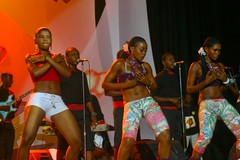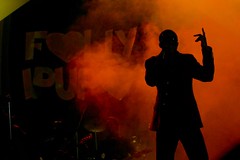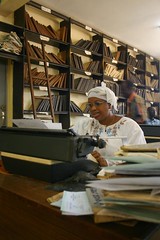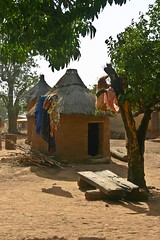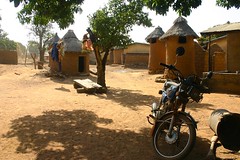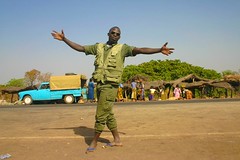Concerts in Abidjan
A combination of photos from Fally Ipupa and Tiken Jah concerts in Abidjan in late 2007, early 2008. The Tiken concert was particularly memorable – I wrote the following piece which I haven’t published till now…
For the last five years international reggae star, Tiken Jah, has lived in self-imposed exile in Mali, to the north of his native Ivory Coast. With a habit of using his lyrics to criticise injustice and corruption, he fled at the start of the civil war when things got too dangerous. But with progress being made towards peace, Tiken Jah has returned to Ivory Coast for two peace concerts. Later today (15th December) he’ll play in the rebel stronghold of Bouake (PRON: Bwa-kay) and last weekend our correspondent John James managed to get a couple of tickets to the sold-out concert in the economic capital Abidjan.
MAIN PIECE
Order and security are generally seen as part of the good life. I wouldn’t necessarily disagree, but there’s also something about the fluidity of moments saturated with experience and unpredictability that lend a certain richness to life. The word security did pop into my head when I entered the sports park, but it was less an emotion I was feeling, than the word I could see stretched in white letters across the huge frames of towering bouncers.
These giants were just a small part of an extraordinary cast of characters. The area squeezed behind the main stage was packed with an odd mix of bodyguards, Rastafarians, soldiers with machine guns, French journalists and assorted hangers-on. People were dancing and swaying unconsciously to the staccato off-beats. The air was a heady combination of sweat and tobacco – or at least some type of smoked substance. It may have been the backstage area, but policeman still felt the need to exercise their batons with violent sweeps against innocent ankles.
We’d arrived by taxi, speeding beneath the skyscrapers and neon lights of the city centre and over the lagoon to the edgy island suburb of Treichville. In colonial times this area was designated the ‘African’ quarter. The guide books warn me against going there after sundown. The reggae off-beats of the warm-up acts pound like a beating heart drawing us towards the densely packed core. As we arrive a woman by the first aid tent tells us there have been 74 injuries and 3 sexual assaults so far. Tiken takes to the stage while another injured person comes rushing by on a stretcher.
One man is eager to speak; ‘Tiken in Abidjan! It’s as if God come down to earth in Ivory Coast because it means peace has come. We were only now waiting for Tiken to make peace, because he stayed in exile for a long time. He’s an Ivorian. We’re proud, we’re happy to see him again.’
As the crowd chant Tiken’s name a tall man with a Jamaican accent and the beginnings of a beard tells me the concert is a kind of rebirth for the reggae music. ‘The rebirth of the music of message. Yeah man. You know what I’m talking about. We’re not from the same ethnic group. It’s a fight against Babylon and Babylon is not a fight against colour, it’s a fight against misery.’
It’s that message that landed Tiken Jah in hot water. In the polarised atmosphere of Abidjan five years ago, political death squads were all too common. Tiken began receiving death threats and several friends were killed, prompting him to flee to neighbouring Mali. In exile he became the top selling African reggae artist, feted at sell-out gigs in France but not played on the national radio station back home.
It was an assault course getting in front of the stage. I clambered through the forest of metal bars holding up the stage like a child weaving through a climbing frame. On the other side hands reached down and lifted me up to stage level to a narrow platform behind the stack of trembling speakers. From this precipitous vantage point I get my first glimpse of Tiken Jah – a towering presence in a long white robe; maps of Africa stencilled across his clothes and attached to the end of shoulder length dreadlocks which whip from side to side.
Despite his absence his has remained popular in Ivory Coast – the crowd sang at the top of their voices to the songs as if there were national anthems. With one voice they shouted down African corruption and western hypocrisy. This wasn’t mass karoke. It was a cry from the heart – lyrics that pull no punches from those at the sharp end of civil war and biting economic decline.
I jumped down into the sea of humanity which swept forward and back like waves on a beach. Security guards linked arm in arm forming the only barrier between the stage and the spectators. To the left and right the same warning is echoed; ‘Be careful – there are expert thieves around us’. The following day I stumbled across a disconsolate group of French journalists comparing notes – the lucky ones had lost mobile phones, others microphones and passports. They pointed ruefully at their now vacant pockets. Halfway through the concert Tiken throws what looks like fistfuls of money over our heads. The unstoppable crowd throws itself forward.
When I meet Tiken later he says this concert was a passionate appeal from young Ivorians desperate for peace. ‘If you are in the peace time the pupils can go to school, the students can study, the trader can do what he can do, every body can be cool. I think today Ivorian people know now the difference between peace time and war time, so we have the choice.’ When analysts discuss power in Ivory Coast they tend to be talking about old men. But down here among the thousands there’s a raw energy and dynamism that you can taste and smell. It excites and slightly terrifies, as T-shirts soaked in each others’ sweat a dark African night shakes to infectious reggae beats.
Travels in the north, Ivory Coast 2007-8
In my first week in Ivory Coast, President Laurent Gbagbo set off to the north of the country for the first time since 2002, so so did I. I went back a few months later to spend a bit more time there are some of these photos are here as well. It was an interesting time as this large rebel zone was peaceful but outside normal government administration.

